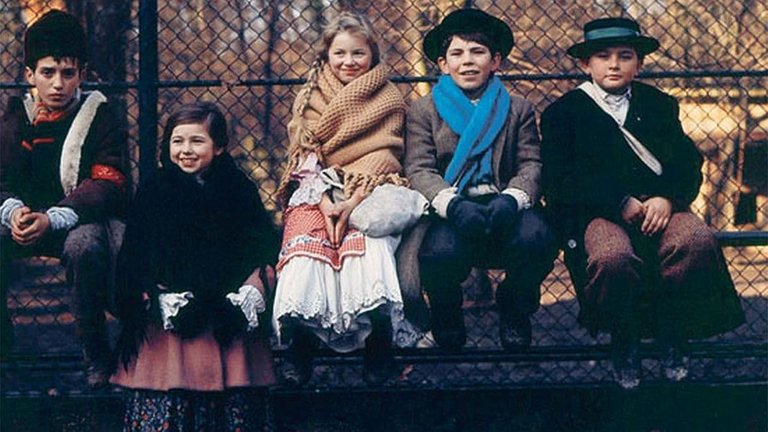Film Review: Train in the Snow (Vlak u snijegu, 1976)

These days the audience is accustomed of having someone’s ideology shoved down their throats while watching films and TV shows. This is nothing particularly new, but in the old days pushing various agendas used to be more subtle and arguably more effective. It always helped to make a good film while doing it. One such example can be found in Train in the Snow, 1976 Yugoslav film directed by Mate Relja, nowadays recognised as the best and arguably the most popular children’s film in the history of Croatian cinema.
Film is based on the novel by Croatian writer Mato Lovrak, partially inspired by real events that took part in early 1930s. Plot is set in 1935 and begins in Veliko Selo (“Big Village”) where local schoolteacher (played by Ratko Buljan) encourages his pupils to form co-operative. Thanks to his natural leadership qualities, Ljuban (played by Slavko Štimac), is elected for its chairman despite his poor background. This creates rivalry with Pero (played by Željko Malčić), arrogant son of a rich farmer and both boys compete for the affection of girl named Draga (played by Gordana Inkret). The co-operative receives invitation to visit the headquarters of children’s magazine in Zagreb and the children are able to see big city for the first time in their life. Their return is, however, beset with hardship and danger. The teacher gets ill and has to remain in hospital and the train carrying them home gets blocked by snowdrift. Ljuban has taken over the leadership of the pupils and with the help of kind-hearted train conductor (played by Edo Peročević) tries to organise his fellow co-operative members and help them go through the increasingly unpleasant and potentially fatal ordeal.
Lovrak worked as schoolteacher in rural areas of today’s Croatia and, as such, he was quite familiar with socioeconomic problems of local population. Like many intellectuals in first half of 20th Century, he saw solution in return to traditional forms of social organisation, mainly co-operatives in which impoverished peasants shared their labour and resources. Many decades later those ideas were looking similar to the official ideology of Communist Yugoslavia. Train in the Snow, unsurprisingly, promotes co-operative as well as collectivism, sharing wealth and personal sacrifice. In the same time film takes clearly negative view of individualism and in the end all the children who have doubted Ljuban or rejected his ideas, including Pero, see the error of their ways and join the collective.
Despite relatively small filmography, Mate Relja was accomplished director. His previous feature film, 1963 WW2 drama Opasni put, showed his skill with young actors. This skill is evident here, where the cast is almost entirely made of schoolchildren who, despite lack of experience, show not only great enthusiasm but also good results in their work, creating memorable characters. The only experienced child actor in the cast is Slavko Štimac, who would play child and adolescent characters in Yugoslav films well in his 30s. His work is complemented by experienced character actors, most notably Edo Peročević who shines in his role. Relja’s script very conveniently divides the film into three segments – the first, set in the village, introduces the characters and also, in a very amusing way, through mock wedding played by children, introduces average audience to local customs; the second allows audience to experience big city, its wonders and challenges, through the eyes of children who see it for the first time; finally, the segment taking place in the train brings drama and suspense. Relja adds a lot of humour in all three segments. Final ingredient is soundtrack by Arsen Dedić, popular singer who was also a prolific film and television music composer. The co-operative anthem, which is performed at the various points in the film, is uplifting and catchy tune which would is fondly remembered by the viewers who have last seen this film many decades ago. The end result is entertaining and heart-warming film that could be recommended not only to children, but even to adults who care little about politics and ideology.
RATING: 8/10 (+++)
Blog in Croatian https://draxblog.com
Blog in English https://draxreview.wordpress.com/
Leofinance blog https://leofinance.io/@drax.leo
Cent profile https://beta.cent.co/@drax
Minds profile https://www.minds.com/drax_rp_nc
Uptrennd profile https://www.uptrennd.com/user/MTYzNA
Hiveonboard: https://hiveonboard.com?ref=drax
Rising Star game: https://www.risingstargame.com?referrer=drax
1Inch: https://1inch.exchange/#/r/0x83823d8CCB74F828148258BB4457642124b1328e
BTC donations: 1EWxiMiP6iiG9rger3NuUSd6HByaxQWafG
ETH donations: 0xB305F144323b99e6f8b1d66f5D7DE78B498C32A7

Very interesting review of this Eastern European film, the subject matter is interesting and even more so being a film from this region of the world. Greetings! @drax
https://twitter.com/draxblog/status/1450779181378416644
The rewards earned on this comment will go directly to the person sharing the post on Twitter as long as they are registered with @poshtoken. Sign up at https://hiveposh.com.